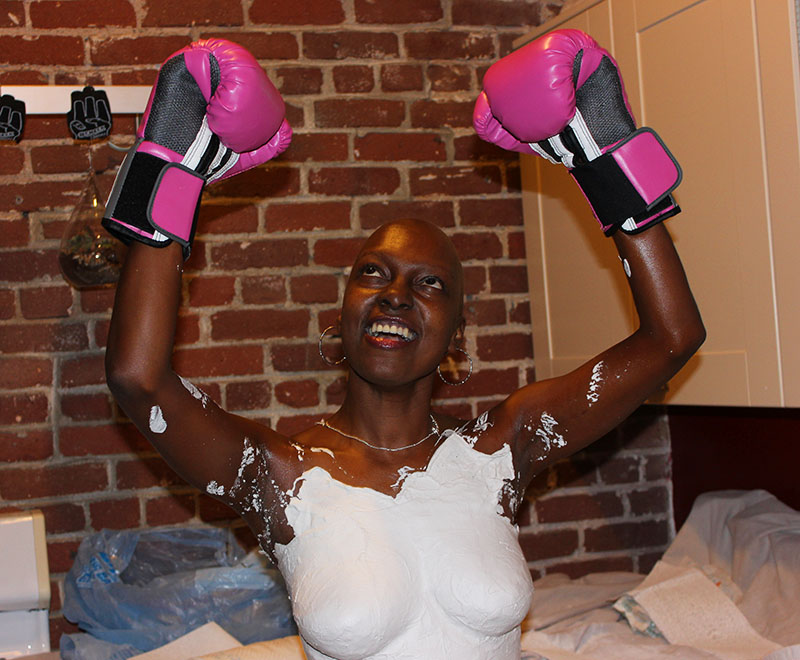Black Breasts Matter
Different communities are disproportionately impacted by breast cancer and other diseases in different ways. These issues need to be addressed and talked about in order to incite change. While breast cancer is more common in white women the mortality rate for black women is higher. This Black History Month, we have been thinking a lot of about these discrepancies, how we can raise awareness about them, and the ways we can ultimately change them.
What does Black Breasts Matter even mean?
The higher mortality rate for black women diagnosed with breast cancer is not that of coincidence but instead rooted from a long history of injustice and inequality. Black women are not inherently less likely to survive breast cancer, it is instead lack of access healthcare, screenings, and education that keep black women in America at a higher mortality rate than their white counterparts.
But don’t ALL breasts matter?
Yes, all breasts matter BUT it is black women who have a higher mortality rate and lack of access.
KAB is committed to bringing education to underserved communities and it’s part of who we are. We are not here to make divisions but to not highlight the community that is affected and wash over it over with the title “ALL BREASTS MATTER” we would not only confuse our efforts but further contribute to the injustices to the black community.
We say #BLACKBREASTSMATTER because black women are dying at an alarming rate from breast cancer and no one is talking about it.
Here are the facts!
African American Breast Cancer Association
The African American Breast Cancer Alliance, Inc (AABCA) is dedicated to building and sharing awareness, connections, education, resources and support for African American/Black women, men, families and communities affected by breast cancer.
To find out what young African American woman can do, we spoke with Reona Berry, a breast cancer survivor and executive director, and co-founder of the AABCA.
What is your story?
I was age 38 when diagnosed and did not think about breast cancer much. I did find a lump earlier at age 35, but it was a cyst.
In June 1989 I found a dark discoloration under my armpit and right breast. I thought it was a rash from deodorant, but it didn't itch or hurt. I ignored it until in October/November I felt pain as my arm moved along my breast during moving, sleeping, walking, etc. In late November, while laying in bed I could no longer ignore the hot, painful lump I found. In January, I finally sought a mammogram and then the doctor did a breast biopsy. He was unable to aspire any fluid from the lump, meaning it was a solid mass. From the doctor's comments, I knew it was not good news. He ordered an excisional biopsy which confirmed breast cancer. I had lumpectomy surgery, chemotherapy, and radiation therapy. I lost all of my hair, but by October it was growing back and I loved the short hairstyles I sported. Breast cancer changed my life in many ways, good, bad and otherwise. Thankfully, I'm still here 26 years later.
I, along with other black women, founded the African American Breast Cancer Alliance and created our innovative educational brochure "Being There" to inform black women and others that breast cancer is a disease that black women needed to be aware of and take action to fight. We can no longer talk about the "Big C", we need to fight it by sharing lifesaving and life-affirming information to help save and support our sisters and community members.
What advice would you give to any young African American girl/boy in terms of living a better, healthier life?
Children can be taught healthy practices with eating good and nutritious foods, exercising, playing, sleeping, caring about others and themselves. Ask your parents, teachers, friends what does it mean to live a better healthier life, read books about health, learn about different diseases (My Mommy Has Cancer is one). Check out programs such as First Lady Michelle Obama’s “Let’s Move” that incorporates fun with learning about healthy foods and movement so they can learn what healthy is and what they can do to achieve a better, healthier life.
What do you feel needs to happen to within the African American community to reduce the breast cancer?
Breast cancer awareness, detection, treatment, and understanding is crucial to reduce the breast cancer incidences and high mortality rates that African Americans experience. We have so much more access to information, detection services, and medical treatments to help us have better outcomes and live longer lives after a cancer diagnosis.
For more information about the African American Breast Cancer Alliance visit aabainc.org
Download our Check Yourself! app on the Apple App Store or Google Play to learn to do a breast self-check & set up an automatic monthly reminder. Early detection is the key.


